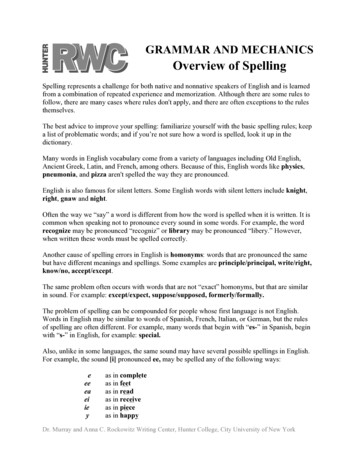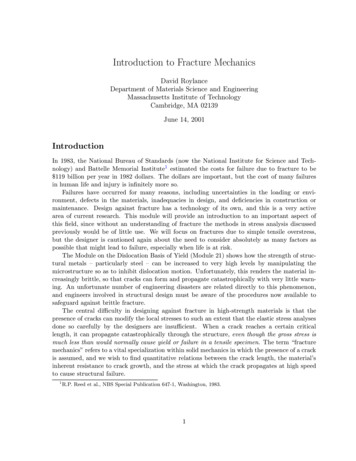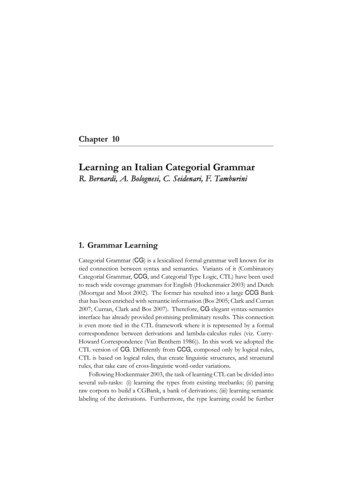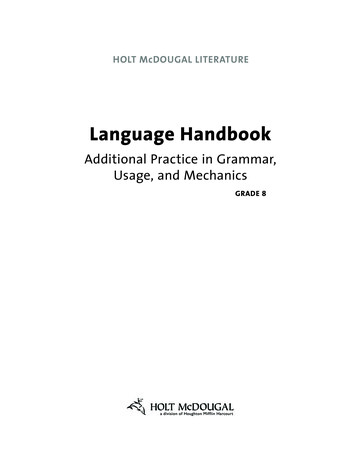
Transcription
GRAMMAR AND MECHANICSOverview of SpellingSpelling represents a challenge for both native and nonnative speakers of English and is learnedfrom a combination of repeated experience and memorization. Although there are some rules tofollow, there are many cases where rules don't apply, and there are often exceptions to the rulesthemselves.The best advice to improve your spelling: familiarize yourself with the basic spelling rules; keepa list of problematic words; and if you’re not sure how a word is spelled, look it up in thedictionary.Many words in English vocabulary come from a variety of languages including Old English,Ancient Greek, Latin, and French, among others. Because of this, English words like physics,pneumonia, and pizza aren't spelled the way they are pronounced.English is also famous for silent letters. Some English words with silent letters include knight,right, gnaw and night.Often the way we “say” a word is different from how the word is spelled when it is written. It iscommon when speaking not to pronounce every sound in some words. For example, the wordrecognize may be pronounced “recogniz” or library may be pronounced “libery.” However,when written these words must be spelled correctly.Another cause of spelling errors in English is homonyms: words that are pronounced the samebut have different meanings and spellings. Some examples are principle/principal, write/right,know/no, accept/except.The same problem often occurs with words that are not “exact” homonyms, but that are similarin sound. For example: except/expect, suppose/supposed, formerly/formally.The problem of spelling can be compounded for people whose first language is not English.Words in English may be similar to words of Spanish, French, Italian, or German, but the rulesof spelling are often different. For example, many words that begin with “es-” in Spanish, beginwith “s-” in English, for example: special.Also, unlike in some languages, the same sound may have several possible spellings in English.For example, the sound [i] pronounced ee, may be spelled any of the following ways:eeeeaeiieyas in completeas in feetas in readas in receiveas in pieceas in happyDr. Murray and Anna C. Rockowitz Writing Center, Hunter College, City University of New York
As noted above, the best thing to do is to keep a list of words that you misspell. It may be helpfulto try to analyze them for the types of errors you make most often. The rules outlined below mayhelp you in some cases, but often you will simply have to memorize and practice. To aidmemorization, try reading, saying, and writing each word several times.SPELLING RULES i before e except after cIf you learn this short poem, you will be able to spell many hard-to-spell words correctly:Write i before eexcept after cor when sounding like aas in neighbor and weigh.Does this rule apply all the time? No, there are exceptions, but it does work most of the time formany of the words you use on a daily basis. Now, let's examine the parts of the rule.Write i before eExamplesbelievepiecepriestdeceivereceiptexcept after creceiveor when sounding like aas in neighbor and weigh.reignfeintfreightExceptionsThe rule applies only when the ei/ie cluster is pronounced as one syllable; it does notapply when the letters are divided between two syllables, as in deity and science.If the word is borrowed from a foreign language, then the rule may not be applicable;examples are sheik and reichsmark.Some words simply don't follow the rule; examples are heir, height, weird.Dr. Murray and Anna C. Rockowitz Writing Center, Hunter College, City University of New York
The following is a list of some additional exceptions to this leseizesleightspeciessteinsurfeittheir drop the final silent eThis rule concerns words that end in a silent e, such as make and argue. When a suffix is addedto a word ending in a silent e, drop the e if the suffix begins with a vowel, for example “-ing,” “ile”; keep the e if the suffix begins with a consonant, for example, “-ment,” “-ly,” “-ful.” Exampleswordservepageeducaterampagetimeatone suffix-ile-ing-ing-ed-ly-ment new xceptionsarguedueintervenejudgetruecanoeconvene -ment-ly-tion-ment-ly-ing-tion entionchanging y to iThis rule applies when you add a suffix to a word that ends in y. Change y to i before a suffixwhen the y is preceded by a consonant; for example, apply -ance appliance. However, do notchange y to i when the y is preceded by a vowel; for example, pay -s pays.Exampleswordflabbylazybywaypray suffix-est-er-s-ed new wordflabbiestlazierbywaysprayedDr. Murray and Anna C. Rockowitz Writing Center, Hunter College, City University of New York
ExceptionsIf the suffix itself begins with an i, as in “-ing” or “-ine,” then do not change the y to i beforeadding the suffix.Exampleswordfrymarryworry suffix-ing-ing-ing new wordfryingmarryingworryingCertain irregular verbs have exceptions to this rule in their past tense form. You canmemorize the irregular past-tense pattern of these three verbs: pay/paid, say/said, lay/laid. doubling the final consonantThis rule is very useful, but it is a bit more complicated than the previous ones. You may find it abit confusing, yet the rule is worth studying, because it explains why there are two “r’s” inpreferred, but only one in preference. The rule for doubling a final consonant has three parts.A final consonant may only be doubled before a suffix beginning with a vowel; e.g., -ed,-ing.The final consonant must be preceded by a single vowel, e.g., get -ing getting, butgreet -ing greeting.The base word must either be only one syllable, sit, stop, spit or it must have an accent onthe final syllable when the suffix has been added, beginning, occurrence, but notreference, or development. An accented syllable is one that is emphasized or is theloudest one you hear.Examples: double the consonantmop begin submit tan -ing-ing-ed-ingExamples: do not double the consonantjump -eddevelop -ingprefer -ence moppingbeginningsubmittedtanning jumpeddevelopingpreferenceDr. Murray and Anna C. Rockowitz Writing Center, Hunter College, City University of New York
The above rules may be helpful in some situations, that is, assuming you can remember all theparts of each rule as well as all the exceptions. Finally, English spelling is a complex,challenging, and even chaotic system. Your surest resources have to be a good memory and agood dictionary.Dr. Murray and Anna C. Rockowitz Writing Center, Hunter College, City University of New York
GRAMMAR AND MECHANICS Overview of Spelling Spelling represents a challenge for both native and nonnative speakers of English and is learned from a combination of repeated experience and memorization. Although there are some rules to follow, there are many cases where rules don't apply, and there are o










